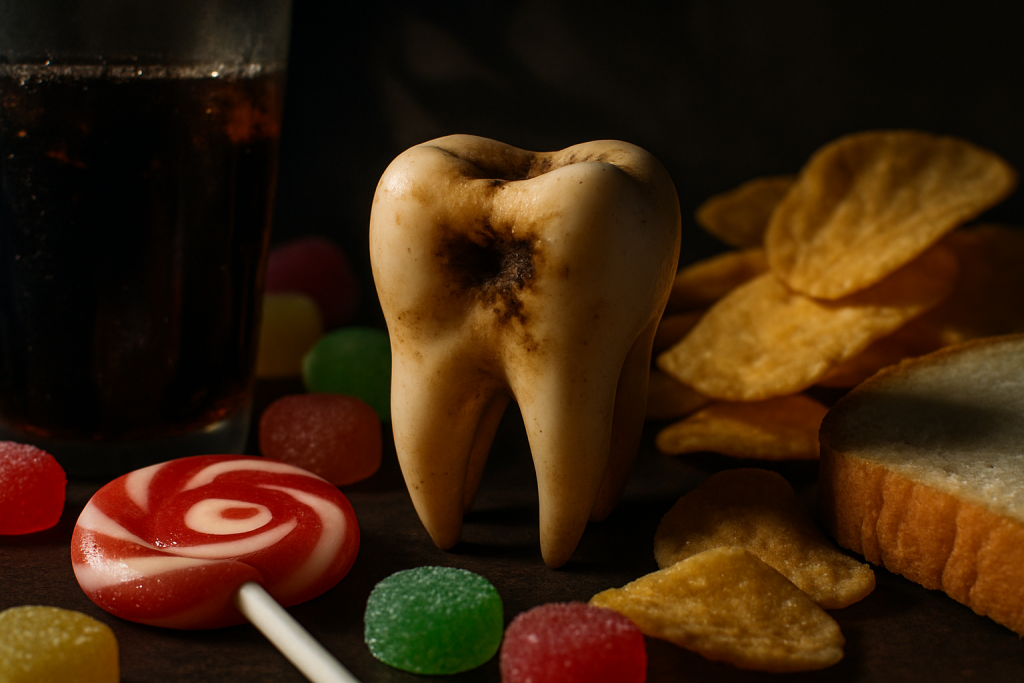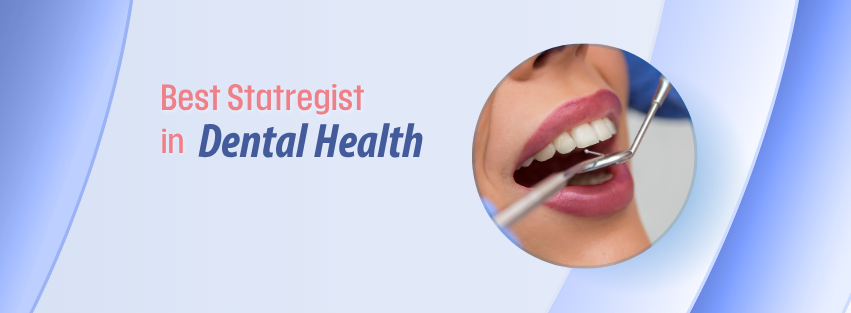
Factors that contribute to rapid tooth decay:
Tooth decay is a common dental problem that affects people of all ages. Understanding what leads to rapid tooth decay can help you protect your smile. Several factors contribute to how quickly teeth can decay, and recognizing these can empower you to make informed choices for your dental health.
Poor oral hygiene:
One of the main culprits behind rapid tooth decay is poor oral hygiene. If you don’t brush and floss regularly, plaque builds up on your teeth. Plaque is a sticky film of bacteria that produces acids when it breaks down sugars in food.
This acid can erode your tooth enamel, leading to cavities. It’s essential to brush twice a day and floss daily to remove food particles and plaque that can lead to decay.
Diet rich in sugars and acids:
Your diet plays a crucial role in dental health. Consuming a lot of sugary foods and beverages provides bacteria in your mouth with a feast. Over time, excessive sugar consumption can significantly increase the speed of tooth decay. Additionally, acidic foods and drinks like soda, citrus fruits, and wine can wear down tooth enamel. Here are some dietary habits to be aware of:
- Avoid frequent snacking on sugary treats.
- Limit soft drinks and fruit juices high in sugar.
- Be cautious with sour candies and acidic foods.
Lack of fluoride:
Fluoride is a natural mineral that strengthens tooth enamel and helps prevent cavities. A lack of fluoride can lead to faster tooth decay. Many communities add fluoride to their drinking water, and fluoride toothpaste is widely available.
But if you live in an area without fluoride, you may want to consider alternatives, such as fluoride treatments from your dentist or using fluoride mouth rinse every day.
Xerostomia (Dry Mouth):
Saliva helps wash away food particles and neutralizes acids in your mouth. When you don’t produce enough saliva, a condition known as xerostomia (dry mouth), your mouth becomes a breeding ground for bacteria.
This increases the risk of decay. Dry mouth can result from various factors, including medication side effects, certain health conditions, or simply dehydration. Staying hydrated and talking to your doctor about managing dry mouth is crucial for preventing decay.
Frequent snacking:
While snacking can be part of a healthy diet, constant nibbling on sugary or starchy foods throughout the day doesn’t give your teeth any time to recover. Each time you eat, your mouth produces acid, increasing your risk of decay. Here’s what you can do to minimize the impact:
- Choose tooth-friendly snacks like vegetables and cheese.
- Try to limit grazing and save snacks for specific times.
- Drink plenty of water to rinse your mouth after snacking.
Dental conditions:
Conditions such as cavities and gum disease can exacerbate the risk of rapid tooth decay. If you have existing dental issues, it’s important to address them promptly. Ignoring dental health can lead to a situation where decay escalates quickly. Regular dental visits can help catch problems early and prevent further issues.
Genetics and age:
Your genetics play a role in how susceptible you are to tooth decay. Some individuals may naturally have weaker enamel or be predisposed to cavities. Age is also a factor—in older adults, gum recession can expose tooth roots, making them more prone to decay. Understanding these personal factors can help guide your dental care routine.
Use of tobacco products:
Tobacco use negatively impacts oral health, leading to dry mouth, gum disease, and an increased risk of tooth decay. Smoking or chewing tobacco can complicate your efforts to maintain good oral hygiene. If you use tobacco, seeking help to quit can significantly improve your overall dental health.
By understanding these factors that contribute to the rapid decay of teeth, you can take proactive steps to protect your dental health. Maintaining good hygiene practices, monitoring your diet, and seeking regular dental check-ups are vital components of keeping your smile healthy and cavity-free.
The role of sugary foods in dental health:
Your love for sugary foods might come with a sweet taste, but it also carries potential risks for your teeth. Each time you indulge in candy, soda, or dessert, you fuel the bacteria in your mouth, creating an acidic environment that can lead to tooth decay. Understanding the role of sugary foods in dental health is vital for protecting your beautiful smile.
When you consume sugary foods, the sugar particles linger on your teeth. Bacteria thrive on these sugars, producing acid as a byproduct. This acid is harmful; it softens and erodes your tooth enamel. Over time, this can lead to cavities.
The more sugar you consume, the more acid your oral bacteria produce, which can decay your teeth at an alarming rate.
Several factors influence how quickly sugary foods can impact your dental health:
- Duration of Sugar Exposure: The longer sugar remains on your teeth, the greater the damage. Sticky sweets like gummies can cling to your teeth and increase the risk of decay.
- Frequency of Consumption: Snacking on sugary treats throughout the day keeps your teeth in contact with acid-producing bacteria consistently. This continuous exposure heightens the chance of tooth decay.
- pH Levels: The acidity of sugary foods is crucial. Foods with low pH levels can cause more damage by eroding enamel faster than neutral pH foods.
Not all sugary foods are created equal. Here’s a look at a few common offenders that decay teeth the fastest:
- Hard Candies: Sucking on hard candies extends sugar exposure without a swift rinse or brush, allowing bacteria time to act.
- Chewy Candies: Gummies and taffy can stick to teeth, making it harder for saliva to wash them away. This sticky residue allows acids to work longer on your enamel.
- Sugary Sodas: Not only do sodas contain high sugar levels, but they also have acidic properties that can further erode tooth enamel. The combination creates a powerful recipe for decay.
- Fruit Juices: While labeled healthy, many fruit juices are sugar-laden and acidic, contributing to tooth decay if consumed excessively.
- Cakes and Cookies: Baked goods often have both sugar and refined carbs, which can also break down into sugars, posing a significant threat to your dental health.
It’s not just the sugary content that matters, but also how often and how you care for your teeth post-consumption. Here are some strategies to mitigate the effect of sugary foods on your dental health:
- Limit Sugar Intake: Reducing your frequency of sugary snacks will help lessen the exposure time for your teeth.
- Drink Water: After consuming sugary foods, rinse your mouth with water. This helps wash away remaining sugar and neutralizes the acids.
- Maintaining Good Oral Hygiene: Regular brushing and flossing are crucial. Make sure to brush at least twice a day for optimal protection against tooth decay.
- Choose Healthier Alternatives: Opt for naturally sweet foods like fruits or unsweetened versions of your favorite snacks.
- Regular Dental Check-ups: Visiting your dentist for bi-annual cleanings and check-ups can catch potential issues early before they become serious problems.
While indulging in your favorite sugary foods occasionally is harmless, it’s vital to be mindful of how these treats impact your dental health. The rapid decay of teeth from sugary items can lead to painful cavities and expensive dental procedures down the line.
By taking small steps to reduce sugar intake and maintaining proper oral hygiene, you can enjoy your sweets while still keeping your smile bright and healthy.
How oral hygiene practices affect tooth decay rates?
Maintaining good oral hygiene is essential for keeping your teeth healthy and preventing decay. Tooth decay occurs when the protective enamel of your teeth is damaged by acid-producing bacteria that thrive in a sugary environment. Your daily habits can significantly influence the rate at which decay occurs. Knowing how these practices impact your teeth can help you make informed decisions for a bright, healthy smile.

Regular brushing is one of the most vital components of oral hygiene. Brushing your teeth at least twice a day removes food particles and plaque, which is a sticky film on your teeth. Plaque can harden into tartar, leading to gum disease and cavities if not removed.
When you brush, make sure to use fluoride toothpaste, as fluoride strengthens enamel and can reverse early tooth decay. It’s recommended to brush for two minutes each time, ensuring that you cover all surfaces of your teeth.
Flossing is another crucial practice that many people overlook. While brushing cleans the surfaces of your teeth, flossing helps remove food and plaque from the tight spaces between teeth and under the gum line. Skipping flossing can allow plaque to build up in these areas, leading to decay. A daily flossing routine can significantly reduce your risk of cavities and gum disease.
Diet plays a key role in your oral health. Sugary foods and beverages are primary culprits in tooth decay. When you consume sugar, bacteria in your mouth feed on it and produce acid that erodes tooth enamel. Here are some dietary tips to help protect your teeth:
- Limit sugary snacks and drinks. Opt for water or milk instead of sodas or fruit juices.
- Choose healthier snacks like fruits, vegetables, and nuts, which are less likely to stick to your teeth.
- Consume foods high in calcium and vitamin D, such as dairy products or leafy greens, which help strengthen teeth.
- Practice moderation, and rinse your mouth with water after indulging in sweets to wash away residues.
Another factor to consider is saliva production. Saliva plays a protective role in your mouth by neutralizing acids produced by bacteria and washing away food particles. If you suffer from dry mouth, you may be at a higher risk for tooth decay. Staying hydrated and chewing sugar-free gum can stimulate saliva flow, aiding in your oral health.
The impact of acidic beverages on teeth:
Your teeth are your body’s natural armor, but they can be vulnerable to many things around you. One of the biggest threats to your dental health is acidic beverages. Understanding the effects of these drinks can help you protect your smile. Here’s how acidic drinks can affect your teeth.
Why are acidic beverages harmful?
Acidic beverages have a low pH level. When you consume these drinks, the acid can weaken your tooth enamel. Enamel is the hard, protective outer layer of your teeth. Once it starts to erode, it exposes the softer dentin layer beneath, making your teeth more susceptible to cavities and decay.
Common acidic beverages to watch out for:
Many favorite drinks may contain high acidity levels. Here’s a list of the most common culprits:
- Soda: Regular and diet sodas are packed with both sugar and acid. Their carbonation can also contribute to enamel erosion.
- Fruit Juices: Citrus juices like orange and grapefruit juice are acidic. While they offer vitamins, they can harm your teeth if consumed excessively.
- Sports Drinks: These drinks can provide hydration but often contain acids and sugars that can be harmful to dental health.
- Wine: Both red and white wines have high acidity levels, which can negatively impact your enamel over time.
- Coffee: While black coffee is less acidic than other drinks, adding cream or sugary syrups increases its acidity and can contribute to dental damage.
Understanding pH levels:
PH is a scale that measures how acidic or basic a substance is. A pH below 7 means the substance is acidic. Many drinks can fall into this category:
- Orange Juice: Approx. pH 3.5
- Cola: Approx. pH 2.5
- Red Wine: Approx. pH 3.5 – 4
A drink with a pH level below 5.5 can start to harm your tooth enamel. It’s important to know which drinks contribute to this damage.
How acidic beverages lead to tooth decay?
When you consume acidic beverages, the acid temporarily softens the enamel. With repeated exposure, this enamel can begin to wear away. This process can lead to various dental issues:
- Cavities: Weakened enamel results in tooth decay, which can lead to painful cavities.
- Tooth Sensitivity: Exposure of the dentin layer can cause increased sensitivity to hot and cold foods and drinks.
- Discoloration: Eroded enamel may show more of the yellowish dentin beneath, affecting the appearance of your teeth.
Protecting your teeth from acidic beverages:
While it may be difficult to avoid these drinks entirely, you can take steps to minimize their impact on your teeth:
- Drink Quickly: Finish acidic beverages faster to minimize contact with your teeth.
- Use a Straw: Drinking through a straw can help reduce the contact of acids with your teeth.
- Rinse with Water: After consuming acidic drinks, rinse your mouth with water to help neutralize acids.
- Wait to Brush: Avoid brushing immediately after drinking acidic beverages, as this can further damage softened enamel.
- Regular Dental Check-ups: Schedule regular visits with your dentist for preventive care and to discuss your dietary habits.
Each step you take can enhance your dental health, allowing you to enjoy a range of beverages while mitigating damage. Remember, your teeth deserve care and attention, and by understanding the impact of acidic beverages, you can make informed choices that protect your smile for years to come.
Avoid tobacco products:
Tobacco use is harmful not only to your overall health but also to your oral health. Using tobacco increases the risk of gum disease, which can lead to tooth decay. Here are some points to consider:
- Quit Smoking: If you smoke, consider quitting. There are numerous resources and support systems available to help you through this process.
- Watch for Chewable Tobacco: Chewing tobacco can create areas of decay in your mouth. Avoid using this type of product to protect your dental health.
Understand the role of fluoride:
Fluoride is a natural mineral that helps to rebuild weak tooth enamel and slow down the progression of decay. Here’s how to make the most of it:
- Fluoride Toothpaste: Choose a toothpaste that includes fluoride. This will provide additional protection against decay.
- Fluoridated Water: Check if your local water supply is fluoridated. Drinking it can offer extra prevention against cavities.
Conclusions:
Understanding what decays teeth the fastest can empower you to make better choices for your dental health. Rapid tooth decay is influenced by various factors, including dietary habits and oral hygiene practices. The sugar-laden foods we often enjoy can lead to an increase in harmful bacteria that produce acids, causing enamel erosion and cavities. It’s essential to be mindful of your sugar intake and to balance it with healthier alternatives.
Moreover, it’s important to recognize how your daily habits impact your teeth. Regular brushing and flossing can significantly reduce plaque buildup and help prevent decay. Remember to choose fluoride toothpaste, as it strengthens your enamel against decay.
